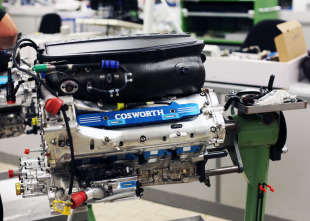- GP Week
2013: F1's chance to change the world

- News:
-
Renault and Cosworth speak up over 2013 engines
- News:
-
McLaren backs move to four cylinder engines
- News:
-
A new formula for 2013 emerges
- Feature:
-
An eye on 2011
- Drivers:
- Martin Whitmarsh
People may not like to admit it, but Formula One is in the midst of a serious financial crisis. Look down any grid and sponsor logos are dwindling like never before. The global economic downturn has hit hard, and it's not about to get any easier.
Title challengers McLaren have a blank rear wing for the first time in years, the Ferrari has never had as many red panels as it does now and Red Bull have struggled to get new partners on-board despite their success. In the midfield, Force India and Toro Rosso would be blank other than the support of their owners, while the Sauber is actually blank thanks to the unceremonious exit of BMW last year. Renault's car is covered with Genii partners' logos and Williams are set to lose two or three major sponsors by year's end. Then there's Virgin who are running to a budget of just €45m thanks to their CFD-only route, while Lotus and HRT are funded largely by their respective owners.
The sport has begun to act and safeguard its future though and in doing so is hoping to change the way all of us use our cars on a daily basis.
In 2013, Formula One will make a definitive step away from fuel-guzzling, high-revving, naturally aspirated V8 engines and move towards low-capacity, turbocharged, fuel efficient engines, making the sport more relevant to the layperson than it has ever been before, and making itself a hotbed of research and development for hybrid technology.
The current generation of Formula One engines (2.4 litre V8) are actually more fuel efficient than any engine in a normal road car, based on a crude calculation of fuel to power, but the massive drag of a Formula One car means they drink fuel at a rate that has become entirely unacceptable to the world as we know it. The negative, fuel-hungry image that has been created of Formula One is driving sponsors away, and has led in part to today's crisis.
Teams and car manufacturers are therefore hoping to tap into Formula One's quick response time, worldwide PR platform and still impressive budget to make the sport cool, green and sexy, by making it more than just a marketing exercise for those involved.
Developments made elsewhere in the automotive world can be done more efficiently, quicker and better in a Formula One world where huge regulation changes and short development programmes are second nature. But it's not just sponsors looking to jump on this green bandwagon, car manufactures may be compelled to join, such will be the advantage of the hybrid technology to fuel consumption.

"The proposal on the table is for a powerplant that's going to be more efficient by virtue of running lower revs and much higher boost and making better use of the fuel efficiency, improving the thermal efficiency of the engine, coupled to mechanisms for trapping and recycling energy which is currently wasted," said Roustis.
"A lot of the energy that we take out of fuel today we use it for heating up the environment in a variety of different ways. It's the next logical development down the thinking which got us KERS [Kinetic Energy Recovery Systems] in the first place, with a more holistic approach to the entire power train."
But it's not just a matter of framing a set of regulations around a fuel efficient, green and hybrid formula. As ever, money has to be of primary consideration, as Roustis says: "From what we can see they are a relevant and technically exciting set of regulations. I think the piece of work that we've still got to do is that we don't inadvertently trigger a financial arms race. The one thing that's very clear to me from discussions with all of my colleagues in the engine manufacturers working group is, big or small, nobody can afford to contemplate an out-and-out spending race."
Ensuring that manufacturers don't spend limitless amounts of money on their engine development programmes is a challenge, but has to be achieved in a sensible way. Limiting development on certain areas of the engine is one possible route.
"We have to recognise that the internal combustion engine has been around for about 100 years now and there's an awful lot of areas that are very difficult to improve," explained Roustis. "There's a whole bunch of things like that where we'll just fix it and we don't need to spend a whole bunch of money to relearn what's been learned over the years."
Instead, teams are hoping to leave certain development routes open, especially ones where savings can be made on fuel consumption.
"If we're going to look at getting a lot of efficiency out of fuel the way that we can make the engine exchange gas and to get better thermal efficiency out of it is where we need to be putting our development effort," added Roustis.
At the moment, teams have no limit on how much fuel they can pour through their engines over the course of a race weekend, although the ban on refuelling for this year has meant that more fuel efficient engines are advantageous during races. That won't be the case in 2013 however, as a fuel flow meter will limit the rate at which fuel can flow into the engine, while a fuel limit will cap the amount of fuel a car can start the race with.
"The big difference this time around is the amount of fuel that we can pour into the engine across the course of the race - it's going to be very, very restricted. That's where the big change is going to come. We've got to get a lot more out of less," continued Roustis.
"We're looking at numbers that are going to sit somewhere between 35% and 50% less than the amount of fuel that we're using today. For a car that's got to do fundamentally the same lap-time and the same sort of distance, it's a big change."
To further incentivise greener powertrains (engine and hybrid technology), it is being discussed that the fuel flow and fuel volume limits will be continually reduced over time, forcing manufacturers to make their engines ever more efficient and further improve the image of the sport. FOTA chairman Martin Whitmarsh insists the teams also have to ensure that the cars and engines remain the most technically advanced on the planet and that the sound of the engine continues to mark it out as such.

"We've also got to do all these things at a time of stringent financial stress for quite a lot of the businesses, and what we mustn't do in stepping from this set of rules to a new set lose people along the way. We will emerge from this economic squeeze stronger but we shouldn't be cavalier and believe that all these teams are going to be here if we get it wrong.
"They've got to sound great, they've got to be exciting to drive, they've got to be perceived to be the most advanced, but they've got to be relevant to society and technologies that we develop."
Having a fuel efficient, green, hybrid sport is one thing, but delivering that message to the fans, politicians and potential sponsors is another problem entirely, one which Tim Roustis admits is "very, very complex".
"Formula One has quite a lot of challenges facing its marketing messaging, but we must never lose sight of the fact that it also has a huge amount that is right at the moment," he began.
"We have to be careful we don't throw the baby out with the bathwater and we need to understand what it is that people really relate to in motorsport and Formula One in particular and make sure we don't lose that. It's a very, very complex problem which is why it's taken so much time from so many people to really think about carefully."
But will a greener Formula One really help in attracting more sponsors to the sport? Harry Gibbings is the Head of Global Sponsorship at TW Steel, a Renault sponsor, and he thinks it will make sponsors less intimidated to join the sport: "From a sponsor's perspective the green ethos is important and, from my point of view with TW Steel, Renault has pushed that to great lengths, taking the technology from the F1 programme and translating it to small fuel efficient cars," explains Gibbings.
"That's not the primary reason that we're in Formula One sponsorship. Obviously we're there to get a return on investment - it hits 450 million people at each round - so from our point of view, that's the important thing. But to have positive green credentials in the future is also an important aspect of it.
"With the new engine regulations, if they publicise the fact that it will translate into road car technology and that it will make road cars more fuel efficient and ecologically sound, people will be less intimidated by coming into Formula One."
If the technological developments derived from the 2013 hybrid regulations succeeds in transferring to road cars in the future, the impact on reducing carbon emissions from the world's fleet of automobiles will be absolutely extraordinary. 2013 is Formula One's chance to change the world and it must succeed. The future of our great sport is at stake.
Read GP Week's bumper 100th issue

